Human blood is a remarkable fluid that carries oxygen throughout the body, fights infections in the body, and contains healing properties when one has a cut, a bruise, or a wound. The complexity and miraculous power of blood to sustain life is truly amazing. In this week’s Torah Portion study we will also discover the spiritual power of blood.
The Blessing and the Curse
In this week’s Torah Portion Moses continues to emphasize the choice that was presented to the people as they were about to enter into the Land of Promise:
See, I am setting before you today a blessing and a curse: the blessing, if you listen to the commandments of the LORD your God, which I am commanding you today; and the curse, if you do not listen to the commandments of the LORD your God, but turn aside from the way which I am commanding you today, by following other gods which you have not known. – Deut. 11:26-28
There is blessing in obedience and a curse for disobedience. To obey the LORD is to follow His commands and to worship Him alone. To disobey the LORD is to reject His commands and to worship other gods.
The specific list of the blessings and curses is detailed in Deuteronomy chapters 27 and 28, however, in this week’s Torah Portion Moses reviews the commandments of the LORD that the children of Israel were to follow:
These are the statutes and the judgments which you shall carefully observe in the land which the LORD, the God of your fathers, has given you to possess as long as you live on the earth. – Deut. 12:1
Moses then commanded them to destroy all of the places of foreign worship and to only seek the LORD at the place which God Himself would choose to place His Name (Deut. 12:2-5).
The Chosen Place
The LORD did not specify to the children of Israel the location of the place where He would place His Name at that time. The Tabernacle was eventually erected at Shiloh after the children of Israel settled in the Land (1 Sam. 1:3), however, this was only a sort of long-term, temporary location until the LORD specified to King David where the Temple was to be built (2 Chronicles 3:1).
It was only at the specific location that the LORD would designate to the Israelites that they were permitted to offer sacrifices, burnt offerings, tithes, contributions, and everything pertaining to worship of Him (Deut. 12:6-12). The LORD wanted to protect the people from straying from holy worship of Him and following the pagan practices of the Land:
Be careful that you do not offer your burnt offerings in every cultic place you see, but in the place which the LORD chooses in one of your tribes, there you shall offer your burnt offerings, and there you shall do all that I command you. – Deut. 12:13-14
By limiting the location of worship and sacrifice to one specific place, the LORD was creating a centralized system of worshiping Him which also provided national accountability.
Meat in Your Gates
Although offerings together with animal sacrifices could only be offered at one particular place in all of the Promised Land, the LORD did allow the people to slaughter meat for eating in their various dwellings:
However, you may slaughter and eat meat within any of your gates, whatever you desire, according to the blessing of the LORD your God which He has given you; the unclean and the clean may eat of it, as of the gazelle and the deer. – Deut. 12:15
The LORD made it clear in this one verse that everyone, whether they are considered ritually clean or unclean, may slaughter and eat meat with the blessing of the LORD “בכל שעריך” – “be’kol sh’arecha,” which is literally translated, “in all of your gates.” It is commonly understood that this term “in all of your gates” is a general term meaning “wherever you live.”
There was no location restriction regarding the day-to-day eating of meat, however, there was one restriction which was emphasized: “Only you shall not eat the blood; you are to pour it out on the ground like water.” (Deut. 12:16) Although there were clear commandments regarding which animals the Israelites could and could not eat, which are detailed in this Torah Portion as well (Deut. 14), the only other commandment regarding the slaughtering and eating of meat was this commandment regarding the blood.
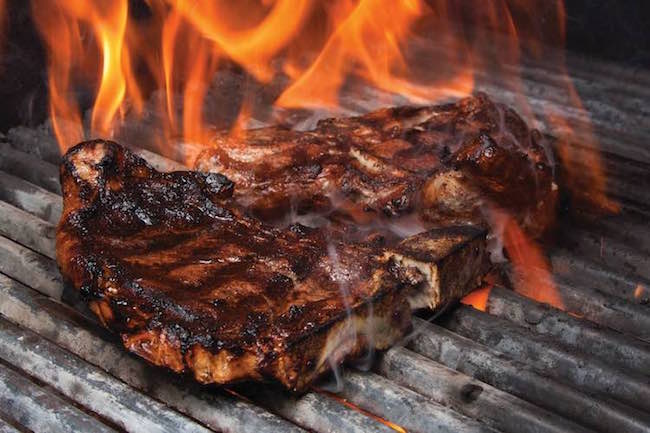
Don’t Eat the Blood!
In the few verses which detail how meat may be eaten in all of the dwellings of Israel (Deut. 12:15-28), the command to “not eat the blood” is repeated throughout this section. It is not simply repeated twice or three times, but it is repeated five times (Deut. 12:16, 23, 24, 25). The command is repeated twice in Deuteronomy 12:23 alone. This command was very important to the LORD and He wanted His people to be sure to obey it.
The command in verse 23 begins with a stern exhortation to not eat the blood: “Only be sure not to eat the blood, for the blood is the life, and you shall not eat the life with the flesh.” The opening phrase of this verse in the Hebrew is as follows: “רק חזק לבלתי אכל הדם” – “rak chazak levilti achol ha’dam,” and is literally translated “Only be strong to not eat the blood.” It seems like God is placing a heavy emphasis on the need to be “strong” and to keep this command of not eating the meat with the blood still in it.
There are various theories of why God commanded His people to “be strong” in this command and many believe it is a warning to not copy the occult practices of the inhabitants of the Land. Although this may be true, I believe there is a more natural and obvious warning here that we see lived out in the life of the Israelites some years later.
The Temptation of Eating the Blood
We read about a situation in the days of King Saul when the King led his armies to war against the Philistines. King Saul had commanded his men to not eat anything until after evening when he had finished avenging himself of his enemies (1 Samuel 14:24). The armies of King Saul were famished and the result was not good:
They struck among the Philistines that day from Michmash to Aijalon. And the people were very weary. The people rushed greedily upon the spoil, and took sheep and oxen and calves, and slew them on the ground; and the people ate them with the blood. – 1 Samuel 14:31-32
The people were tired and hungry after having fought in battle all day without eating. Because of their weak and tired condition they chose to not drain the blood of the animals but simply to eat the meat with the blood still in the animals. This would be considered non-kosher meat today because the blood was not drained out.
Following God’s commands requires a strength and a willingness to pay the price to do what He demands. It may seem like such a simple and logical command to “not eat the blood,” however, God knows the weakness and laziness of humankind. This is why God said, “Only be strong not to eat the blood” and repeated this command five time in this one section of Scripture.
Blood = Life
This stern command of the LORD to “not eat the blood” was not given without a reason. The LORD provided a very clear explanation for this command in the same verse quoted above: “Only be sure not to eat the blood, for the blood is the life, and you shall not eat the life with the flesh.” (Deut. 12:23)
The phrase “for the blood is the life,” in Hebrew is “כי הדם הוא הנפש” – “ki ha’dam who ha’nafesh.” The Hebrew word for blood is “דם” – “dam” and this is very straightforward in the text, however, the Hebrew word for life is “נפש” – “nefesh” and this word can mean “soul, life, living being, person, or that which breathes.” Blood is equated with the very soul of a human being and of the very person himself. The blood is the life!
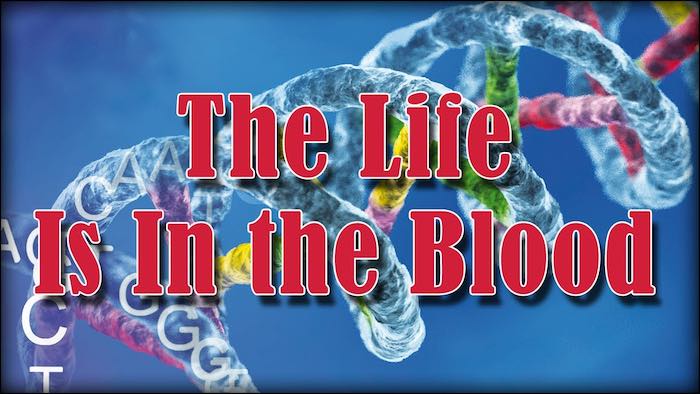
Atonement by the Blood
In the book of Leviticus we read of the repeated warning not to eat the blood of animals with the same explanation that the life is in the blood (Lev. 17:10-14), however, in the verses in Leviticus we are given one more piece of information that helps us to further understand the significance of the blood:
For the life of the flesh is in the blood, and I have given it to you on the altar to make atonement for your souls; for it is the blood by reason of the life that makes atonement. – Lev. 17:11
This verse reveals to us that the purpose of the sacrificial system which God commanded His people to perform was for the goal of making atonement by means of the life that is in the blood.
In the verse quoted above, the word “נפש” – “nefesh” appears three times in the Hebrew. This word is translated into English twice as “life” and once as “souls,” however, in each case it is the same exact Hebrew word, “נפש” – “nefesh.” By using the same Hebrew word for the life of the atoning sacrifice and the lives of the people of Israel, the Word of God is clearly declaring that atonement is made life for life!
Blood is the source of life and it is by the blood sacrifice that human life is atoned for. The animal sacrifices, as commanded in the Old Testament, were a means of atonement, covering of sins, life for life, as declared in Leviticus 17:11. Although this may seem obvious to those of you who already believe in Yeshua as the Messiah, this concept of blood atonement for sin is generally rejected in Orthodox Jewish circles.
Is Repentance Enough?
Orthodox Judaism teaches that genuine repentance from sin is sufficient for taking care of one’s sins before God. Rabbi Lau, the former Chief Rabbi of Israel, provides the following explanation of the rabbinic Jewish perspective of taking care of one’s sins:
True repentance has the power to annul our sins against God, while sins between humans require, in addition to the steps of repentance outlined above, undoing the damage done to the other person… The very fact that we can repent and absolve our sins is one of the greatest gifts that God gave us, enabling us to turn over a new leaf in our lives. – Rabbi Israel Meir Lau. Practical Judaism. Modern Publishing. Tel Aviv 1997. p. 238
While repentance is clearly a biblical command, Orthodox Judaism fails to include the necessity of an atoning blood sacrifice for sin in its principles of faith.
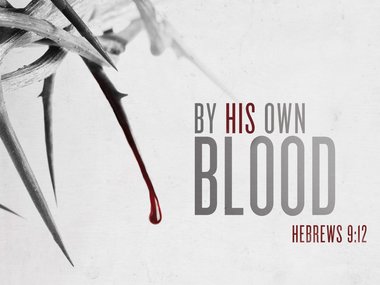
The Foundation of the Blood
In this week’s Torah Portion commentary I have clearly identified the teaching in the Torah regarding the emphasis that the LORD Himself places on the atoning blood sacrifice, combining the truth that life is in the blood (Deut. 12:23) and the atonement which is made through the blood sacrifices (Lev. 17:11) which are detailed in the book of Leviticus. To reject this foundational element of life for life of the atoning blood sacrifice is to reject a clear foundational truth of the Torah.
The writer of the letter to the Hebrews in the New Testament focuses the majority of his teaching in explaining the fulfillment of the levitical priesthood and the atoning blood sacrifice through the life and death of Yeshua the Messiah:
But when Messiah appeared as a high priest of the good things to come, He entered through the greater and more perfect tabernacle, not made with hands, that is to say, not of this creation; and not through the blood of goats and calves, but through His own blood, He entered the holy place once for all, having obtained eternal redemption. – Hebrews 9:11-12
It was by the blood of bulls and goats that atonement was made until the time that Yeshua the Messiah appeared. Then by His own blood, His perfect, sinless blood, He provided atonement once for all, His life for our lives. It was complete and it was finished.
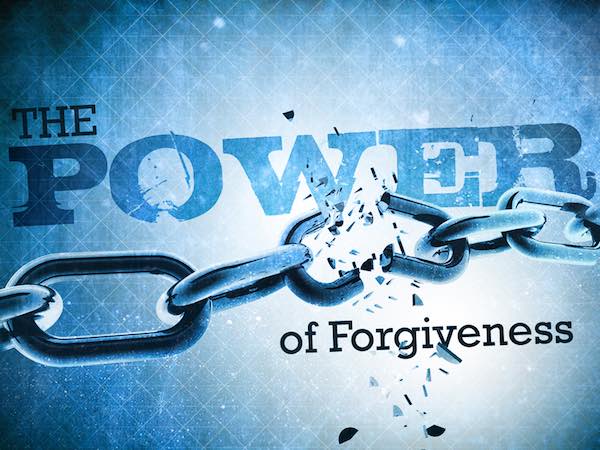
Cleansing and Forgiveness by the Blood
Later in this same letter to the Hebrews, the writer further explains the basis of using blood in both sealing a covenant and in providing atonement for sin:
For when every commandment had been spoken by Moses to all the people according to the Law, he took the blood of the calves and the goats, with water and scarlet wool and hyssop, and sprinkled both the book itself and all the people, saying, “This is the blood of the covenant which God commanded you.” And in the same way he sprinkled both the tabernacle and all the vessels of the ministry with the blood. And according to the Law, one may almost say, all things are cleansed with blood, and without shedding of blood there is no forgiveness. – Hebrews 9:19-22
Blood is the ultimate cleansing agent of God to purify His people from all sin. Without the shedding of blood there is no forgiveness!
The writer of this letter to the Hebrews constantly quoted and referenced the Torah in his writings. By emphasizing the power of blood to seal, cleanse, and provide forgiveness he was referencing the truth revealed in the Torah that life is in the blood (Deut. 12:23) and that there is only atonement of sin by the blood of the sacrifice (Lev. 17:11).
The Blood of the Passover Lamb
Through the mysterious plan of God, Yeshua came into this world for the ultimate end of identifying with the one sacrifice whereby He could declare to His disciples and to the world that He would become the sacrificial Passover Lamb by His blood and inaugurate a New Covenant:
While they were eating, Jesus took some bread, and after a blessing, He broke it and gave it to the disciples, and said, “Take, eat; this is My body.” And when He had taken a cup and given thanks, He gave it to them, saying, “Drink from it, all of you; for this is My blood of the covenant, which is poured out for many for forgiveness of sins.” – Matt. 26:26-28
Yeshua took the traditions and biblical foundation of the Passover ceremony and declared that His own blood would provide for the forgiveness of sins of many. To read more about the connection between Yeshua and the Passover sacrifice, I recommend the following article – God’s Sacrifice
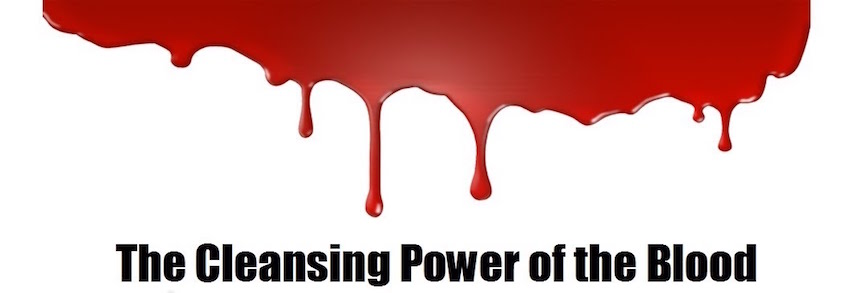
We must understand the power of life which is in the blood. The implications of the truth that life is in the blood are a physical reality and a spiritual necessity. God Himself has provided forgiveness for our sins through the sacrifice of His own Son, and this forgiveness is in His blood alone.
Shabbat Shalom!
If you enjoyed reading this article, share it today with friends! We also invite you to sign up for our weekly Torah Portion commentary on the sidebar to the right.
Help keep our weekly commentaries free and available to all. Click here to donate today:
Torah Portion: Deut. 11:26 – Deut. 16:17
Haftara: Isaiah 66:1-24
Return to Torah Portion Homepage
Copyright Jewels of Judaism. All rights reserved 2016

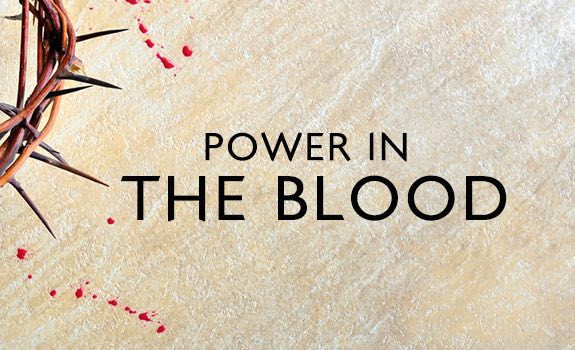

Hi Daniel, thanks for the very informative commentary and I’ve learned a lot from this article, especially the significance of blood on making both covenant and atonement. This is exactly what Yeshua has done for us!
I have a question. You mentioned that Orthdox Jews believe that true repentance is enough to deal with the problem of sins before God. So what do they understand about the significance of sacrifice by shedding blood of animals?
Hi Nancy,
Good question. In short, Orthodox Judaism teaches that the sacrificial system was a nice supplemental part of worship of God and there were a few sins that required a sacrifice but most just needed repentance and doing what was right. Take a look at this article for more details: http://jewelsofjudaism.com/sacrifice/
Shavua Tov,
Daniel
Hi Daniel,
I have tried to send you love offerings. PayPal not working for me and the letter was retuned “unable to deliver”. The address I have is Ben Yehuda Jerusalem 94583 ISRAEL. please send me an address.
Thanks Elaine Maheux
elaine.maheux@gmail.com
Hi Elaine,
Thanks for trying. I’ve sent you an email.
Daniel